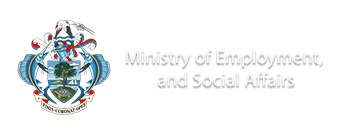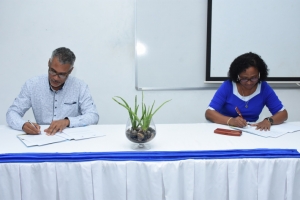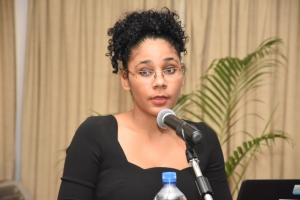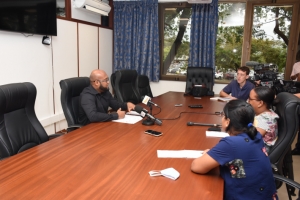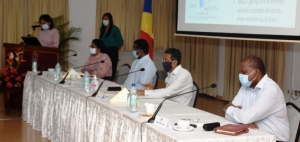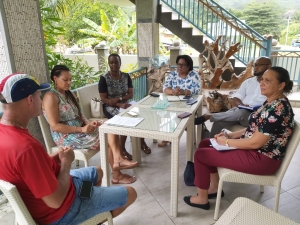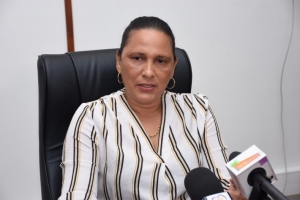Sets, TGMI partner to provide training for workers made redundant
The Guy Morel Institute and the Seychelles Employee Transition Scheme have formalised their partnership with the launch of the ongoing ‘on-boarding programme’ for workers made redundant as well as a newly introduced ‘entrepreneurship skilling intervention programme’ for local entrepreneurs and small business owners.
The agreement to formalise the training partnership between the two institutions was signed in a short ceremony yesterday afternoon at The Guy Morel Institute (TGMI) premises at Majoie.
TGMI executive director Shella Mohideen signed on behalf of the institution while the chief executive of the Seychelles Employee Transition Scheme (Sets), Guy Morel signed on behalf of the scheme.
This was in the presence of Sets’ chairman Aubrey Lucas, chief executive of Enterprise Seychelles Agency (Esa) Angelic Appoo, Sets board members and staff, some graduates from the first cohort of the on-boarding programme among other guests.
The newly introduced ‘Entrepreneurship skilling intervention programme’ to start in the third week of August 2020, is also in partnership with Esa. It has been specifically designed to sharpen the entrepreneurial skills of the local entrepreneurs and small business owners. It is a fact that quite a number of people in Seychelles are self-employed but they enter the business world without formal training or the necessary skills.
In this time of economic crisis brought about as a result of the COVID-19 pandemic, quite a number of them are not able to be productive and therefore are relying on government for assistance. So the up-skilling training programme, which will be for five weeks, will be focusing on various entrepreneurship objectives that will help them to be more competent and better prepared to join the business world.
The on-boarding programme by Sets, in collaboration with TGMI, is to give new skills to workers made redundant, preparing them for work placement in other fields of work.
Among other objectives, the re-skilling training programme also provides the clients with the opportunity to look at the career path, in terms of their ongoing professional development, to embrace this new normal in the wake of the pandemic.
A first cohort has already successfully enrolled and has successfully been placed on temporary employment in work places where some of them will have the possibility of full employment later on. The programme is supposed to end by the end of December 2020 after which it will be reviewed. The second on-boarding programme will start sometime next month.
The presentation of both programmes was made by Mrs Mohideen. She claimed that 250 seats are available under the ‘entrepreneurship skilling intervention programme’. Other than advertising for the available seats, Sets, TGMI and Esa are calling on local entrepreneurs and small business owners to register for the voluntary training programme.
Mrs Mohideen said TGMI has revised some of its programmes to accommodate the COVID-19 crisis and also is very happy with the increase in self-funded learners registering for training with the institute in this time of crisis.
She said with the increase in number of vacant posts that were occupied by expatriates, people should take the opportunity to develop their career path through study so that they can therefore obtain the required skills and qualifications to fill the vacant positions.
Patrick Joubert
300 cases of redundancy registered, most workers already in work placement
Since it was set up six weeks ago, the Seychelles Employee Transition Scheme has until now received 300 cases of redundancy of which 55 are on Praslin and six on La Digue, but it has managed to place almost all the individuals on Mahé in work placement contrary to those on Praslin and La Digue.
Seychelles Employee Transition Scheme (Sets) chief executive Guy Morel gave those details yesterday at State House following a meeting with President Danny Faure to update him on the progress that Sets has made so far as well as the other programmes in place to support workers made redundant.
The meeting at state House was also attended by the Minister for Employment, Immigration and Civil Status Myriam Telemaque and the Minister for Family Affairs Mitcy Larue as well as other representatives of the two ministries.
Mr Morel also announced that Sets’ office has now been set up and is located in Room 2 at the ICCS and its phone number is 4325333.
In addition to the work placement, Sets is also targeting three major projects. It is in the process of setting up its offices on Praslin and La Digue.
Mr Morel said Sets also informed President Faure about the three projects it is undertaking, namely the Entrepreneurship skilling intervention programme, Tourism upskilling programme and ‘Rebwazman’ project on Praslin.
Entrepreneurship skilling intervention programme
Sets and The Guy Morel Institute signed an agreement earlier this week to formalise their partnership with the launch of the ‘Entrepreneurship skilling intervention programme’ expected on August 24.
“The programme has been specifically designed to sharpen the entrepreneurial skills of the local entrepreneurs and small business owners. The training will target some 250 people who are already in business and will mainly focus on leadership and how to help the Seychellois move a step forward in their career path,” explained Mr Morel.
Tourism upskilling programme
Next week, Sets will sign an agreement with the Seychelles Tourism Academy for the ‘Tourism upskilling programme’.
“Based on our discussions with our partners we found out that there is a gap in terms of management and leadership capabilities to try to fill the void and promote Seychellois talent. We are targeting to recruit 125 Seychellois. We hope that when the economy picks up again, the newly trained people will be considered for promotion in their respective work place,” explained Mr Morel.
‘Rebwazman’ project on Praslin
Sets is hoping that with the project ‘Rebwazman’ on Praslin, they can plant some 500,000 plants.
“But from August to December we are hoping to plant 100,000 trees. This is an ambitious project but if we need transformation we need to take bold steps. This project already existed and was being done by Trass (Terrestrial Restoration Action Society of Seychelles) and by increasing the number of trees to be planted, we will cater for the people made redundant on Praslin,” Mr Morel highlighted.
Meanwhile, Letimie Dookley, director general of the employment promotion division, added that in general there are a lot of opportunities in Seychelles right now even though it is not the dream opportunities for many.
“After we briefed President Faure on how the different programmes are working within the employment division, we also talked on how to collaborate with the other partners such as Sets, private and government sectors, Agency for Social Protection to address the gaps in the process. The different programmes are proving to be successful and mainly the internship programme with the young graduates. There were 4,000 people who registered for the unemployment relief scheme and we have succeeded in placing 1,000 in jobs. Today, we focused mainly on the remaining 3,000 persons. These people are either waiting for a placement and we are asking all the ones concerned to come forward and meet with us and take up new opportunities. We cannot afford to leave anybody out right now and we do not want people to stay at home and being unproductive,” Mrs Dookley pointed out.
She further noted that there are also 600 young people who registered with the ‘My First Job scheme’ programme and 300 have already got a job and others are on placements.
“This is an opportunity to congratulate our youth as they understand the situation and have joined the bandwagon by accepting the allowance the government is providing,” noted Mrs Dookley.
Both Mrs Dookley and Mr Morel stressed on the fact that opportunities are here and people facing difficulties should contact them to be helped.
Vidya Gappy
Impact of unemployment on poverty being investigated
Key stakeholders from the employment department, labour associations, recruitment agencies and representatives from the Seychelles National Youth Council have learned of the different factors that contribute to multidimensional poverty in Seychelles.
This was during an information session on Friday when the department of poverty alleviation in collaboration with the National Bureau of Statistic (NBS) shared with those present the results and findings of the third Multidimensional Poverty Index (MPI) survey conducted during the third quarter of last year.
This follows the presentation of the Seychelles National Multidimensional Poverty Index (MPI) survey document on May 21, 2020.
The survey examines the link and impact of education, health, living standards and employment on poverty in the country. It was based on a nationally representative sample of 1,200 households and it was jointly carried out by the NBS and poverty alleviation department.
The dissemination and discussion session on Friday had a particular focus on the employment dimension, elaborating on the employment indicators that contribute the most towards multidimensional poverty.
It was pointed out that factors such as unemployment and informal employment contribute towards multidimensional poverty and should therefore be addressed in strategies and policies. It was also an opportunity for the facilitators to gather views, comments and suggestions that will be useful for further analysis of the impact of unemployment on poverty, as well as for policy interventions.
After an introduction by the principal secretary for poverty alleviation, Alvin Laurence, the delegates were given an overview of the MPI by principal statistician Maria Payet and statistician Julia Joubert from NBS.
From their presentations, the MPI is a multidimensional poverty measure which identifies those who are deprived in several dimensions at the same time. The survey reveals who is poor and how they are poor and the average number of deprivations that each poor person experiences.
The deprivations are measured in terms of indicators which are grouped in dimensions. The dimensions of the Seychelles MPI are: living standards, health, education and employment.
The living standards dimension is made up of indicators such as overcrowding, housing condition, water and electricity access and disconnection and crime. These are some of the issues that are faced by some Seychellois households.
The indicators within the health dimensions shed light on the issue of undernourishment and obesity and whether these conditions are related to other issues which in turn cause deprivations. The health dimension also considers the effect of substance use and abuse as well as teenage pregnancy on wellbeing.
The education dimension explores how school attendance and education level interacts with other indicators to cause deprivation.
The employment dimension shows the effect of being unemployed and the effect of being in informal employment on wellbeing. The experience of young people who are not at school or in training, and also not in employment is also examined to see how it relates to other indicators which in turn lead to deprivation.
In order to be considered as multidimensionally poor, a person must be deprived in four indicators.
The results of the survey show that 11.88% of the population experienced multidimensional poverty and each poor person was on average deprived in 33.26% of the indicators.
It has also been found that more than half (53.11%) of those who are unemployed have insufficient living space.
In addition, 58.6% of those in informal employment have experienced teenage pregnancy. It is also interesting to note that over two thirds (73.40%) of those experiencing NEET (youth aged 15-24 years not in employment, education or training) have also experienced teenage pregnancy.
The poverty alleviation department and NBS have also held a general MPI dissemination session on May 17, 2020 on Praslin. Other sessions involving other dimensions indicators will be held for other related stakeholders on Mahe in the coming weeks.
For a more detailed understanding of the results of the MPI survey, the report can be downloaded on www.nbs.gov.sc . The next MPI survey will be conducted in 2021.
Patrick Joubert
Expired GOP given a three-month stay order
Gainful occupation permits that have expired can now be extended for up to three months to allow for ample time for repatriation arrangements and reopening of the airspace.
With over 5,700 gainful occupation permits (GOPs) set to expire before the end of the year, the Ministry of Employment, Immigration and Civil Status has put in place a special framework to address related issues caused by the pandemic.
Principal immigration officer Erica Dufrenne explained that an employer who decides not to renew the GOP of its worker(s) may request for an extension so as to legalise the status of the worker (s) in the country until their departure.
She noted that the framework was developed cognizant of the fact that COVID-19 has made traveling quite difficult, and in some cases impossible.
“It is important for an employer to approach the immigration office to legalise the status of their workers with expired GOPs. If they do not the worker may be considered to have overstayed his/her permit and will be deported as prohibited immigrant,” Mrs Dufrenne noted.
Extension of GOP for that purpose will be free of charge due to force majeure from July 1 to December 31, 2020 and medical certificate of the expatriate worker will not be required for process.
The same avenue will be made available to expatriate workers who have been made redundant but who cannot travel back home because of travel restrictions.
Nonetheless, the employer will remain responsible for providing adequate shelter and food for the expatriates up until their departure.
“There are mechanisms in place to ensure that employers respect these requirements, such as the section that undertakes inspections and monitoring that will investigate any complaints that have to do with expatriate workers,” stated the director general for labour migration Benilda Cupidon.
Additionally, the framework will also allow employers to renew GOPs of their expatriate worker without the usual condition that requires expatriate workers to leave Seychelles during the process. This again is due to the COVID-19 restrictions.
However, all other conditions are to be met including testing the labour market to identify whether there are competent and available locals for a post.
No labour market test will be required for organisations below quota until December 2020.
All immigration fees will also be applicable to renewal.
Meanwhile, employers with expatriate worker on valid GOP who are presently stuck out of the country, must write to the employment department to inform either of their interest to retain the workers or to let them go.
In the case of the latter, the expatriate workers will be allowed to return only to pick up their belongings, and permission to return to Seychelles will be granted based on guidelines from the Public Health Authority.
Elsie Pointe
Employment status due to COVID-19
262 Seychellois, 198 expatriates made redundant
Two hundred and sixty-two (262) Seychellois and 198 expatriates have been made redundant, according to the labour department.
Director general for labour relation within the employment department, Steve Monnaie told the media in an interview yesterday morning at Independence House that from March to July 7, 2020, the department of employment in the Ministry of Employment, Immigration and Civil Status received 133 applications for redundancy involving 745 Seychellois and 466 expatriate workers. Forty-two (42) applications have been approved involving 262 Seychellois and 198 expatriates.
Mr Monnaie noted that seven applications are on hold because the companies have received financial assistance from government under the Financial Assistance for Job Retention (FA4JR), while five businesses have withdrawn their applications.
The figures also include those from Praslin – 33 applications in total involving 97 Seychellois and 86 expatriates. Of the 33 applications, 17 have been approved with 51 Seychellois and 27 expatriates being made redundant.
The department received eight applications from La Digue involving 13 Seychellois and two (2) expats, out of which four applications were approved for the laying-off of seven Seychellois and two expats.
“Currently, the applications received concern mainly the tourism sector, security firms, cleaning agencies, landscaping companies and souvenir shops. On Praslin alone, nine souvenir shops are closing down. We are here to protect the interests of both employers and employees. We are urging all employers to follow the rules and guidance set by the employment department and to know more about what redundancy means. Redundancy is when an employer reduces its workforce because a job or jobs are no longer needed. There are procedures to follow and employers and employees need to get acquainted with the law in order to better prepare and protect themselves,” explained Mr Monnaie.
What are some reasons for workers to be made redundant?
Mr Monnaie explained that according to the section 50 under the Employment Act, redundancy can take place when a business is planning to cease to operate, in whole or part or temporarily or temporarily suspending, in whole or part, the operation of a business for any reason specified in section 48 (1) of the Employment Act; reconstructing the operation of a business for the purpose of facilitating improvement in the business by which greater efficiency and economy can be affected; or introducing new technology in a business.
What needs to be done for termination of employees under the redundancy process?
The employer must first notify the employment department 21 days before it intends to give notice of redundancy and provide the following information: the reason for the proposed termination; the number of workers concerned; the names, ages, occupation, date of engagement, contact details, address, education level and wages of the workers concerned; whether the proposed termination relates to an activity in a particular sector of the business or to the business as a whole and the criteria used for selecting the workers whose contracts are to be terminated.
In order for an application to be processed, a processing fee is paid, the notification is registered and consultation is scheduled for the employer and workers to appear before a competent officer, who, after hearing the parties, makes a determination and informs them in writing.
“So far we have respected the 21 days and if a business does not pay the fee or produce the necessary documents on time it cannot expect an answer within the 21 days. There are unfortunately some businesses which do not want a member of their staff in their team and are using the COVID-19 pandemic as an excuse to make staff redundant. We are investigating some of these cases,” noted Mr Monnaie.
What are the fees payable by the employer upon making an application for redundancy?
1) Application to make 1-5 workers redundant, the fee is R300,
2) Application to make 6-20 workers redundant, the fee is R700,
3) Application to make 21-50 workers redundant, the fee is R800, and
4) Application to make 51 and above workers redundant, the fee is R1,000.
Mr Monnaie concluded by stating that “currently we are living in a stressful period where many jobs are at stake. The employment department has predicted that around 4,000 workers will be made redundant. We urge employers and employees to get better acquainted with the Employment Act so that no one loses out.”
Vidya Gappy
COVID-19: Re-opening of Seychelles to commercial flights
President Faure chairs first review meeting
A first review meeting in preparation to re-open Seychelles to commercial flights on August 1 was held yesterday, bringing together stakeholders across all sectors in government and the private sector.
The high level committee for the integrated management system for the re-opening of Seychelles to commercial flights is chaired by President Danny Faure.
The half-day meeting, which was held at the Seychelles Trading Company (STC) yesterday morning, was basically to measure the level of preparedness against the spread of coronavirus (COVID-19) that Seychelles as a country has reached before the re-opening of our country to the outside world in the wake of the pandemic.
The various measures being put in place before allowing the re-opening of our boarders to commercial flights include standard operations procedures in all sectors across the country alongside the necessity to educate, train and prepare our people so that they understand the need for visitors to come back to our shores.
The stakeholders’ representatives at the meeting included education, health, Citizens Engagement Platform of Seychelles (Ceps), Seychelles Interfaith Council (Sifco), Seychelles Chamber of Commerce and Industry (SCCI), Seychelles Hotel and Tourism Association (SHTA) among other governmental and private organisations. They reported to the committee on their level of preparedness and how far they have reached in implementing the sets of measures given, including staff training that will allow the country to welcome outside visitors.
Following the meeting, Tourism, Civil Aviation, Ports and Marine Minister Didier Dogley who also chairs the National Framework for the re-opening of Seychelles (a smaller task force that works on the modality and measures), said some progress has been achieved, especially at government level in preparing the country to welcome visitors but a lot more needs to be done. He said a number of organisations have reached between 60% and 100% preparedness to welcome outside visitors while others are lagging behind.
As example, he claimed that out of the 700 tourism establishments, only 41 from 200 that have applied to welcome foreign visitors have been certified as ready to welcome them. He also claimed that in schools, the majority have not been certified as ready in the country’s preparedness plan and that more work has to be done to raise their level of preparedness. He said that the churches are ready in terms of ordinary sermons but face the challenge of social distancing during funeral services which at the moment are not being respected. He added that a way forward has to be found to remedy the situation.
“Definitely, we will have a second evaluation review on July 21 and we hope that by then everybody would have reached at least a certain level so that we can be confident and comfortable with the August 1 re-opening of Seychelles to commercial flights and foreign visitors. If not, the government will have to re-assess its position as to whether or not to re-open the country to commercial flights,” said Minister Dogley, noting that hygiene is one of the most important aspects of the preparedness to welcome visitors.
Minister Dogley also noted that we, the Seychellois people, need to understand that re-opening our country to foreign visitors does not mean only the tourism establishments which have to be ready, but the whole country.
“Everybody needs to be prepared because visitors will not only stay in their hotels. They will go through the airport and might decide to take a taxi, rent a car and might take a trip to Praslin or La Digue and you might meet them on the road or on the beach and so everybody must be prepared, particularly those people who work in companies and establishments where tourists will be present,” he added.
He highlighted the need for other people working in other types of businesses unrelated to tourism, to prepare themselves to ensure they are not infected with the virus in spite of measures being put in place to stop the virus from entering the country.
“So at the level of the country, be it in schools, businesses and everywhere, everybody must take the necessary precautions and must be vigilant to make sure that they protect themselves and their families and everybody around them,” Minister Dogley said, noting that we should not treat visitors as being in the country only to spread the virus.
Minister Dogley explained that apart from the economic side, the main reason why it was decided to re-open Seychelles to commercial flights as early as August in the wake of the pandemic, is for the country to send a signal of confidence to airlines and tour operators that are selling our country that we are committed and ready to welcoming back visitors or else they will neglect our country and send the same tourists who were destined to come to Seychelles, to other places. He noted that in light of competition with other destinations, by then it will take time to regain the confidence of those airlines and tour operators to sell Seychelles as a tourist destination.
SHTA chairman Sybille Cardon claimed that through a survey, the low level of certified tourism establishments in relation to preparedness to welcome foreign visitors was because some of them are postponing the re-opening of their doors for later during the year or by next year. This is because they believe the incoming tourists will not sustain the cost of operation, among other reasons.
As for SCCI chairman Oliver Bastienne, he said the private sector is onboard and is engaging fully to get the country to re-open its borders so as to slowly get our economy back on its feet.
Patrick Joubert

Minister Telemaque visits La Digue tourism establishments
Ministry of Employment, Immigration & Civil Status Communique
In this current economic climate where many businesses are facing difficulties as a result of the COVID-19 pandemic, it was necessary for the government to introduce certain measures to ease the impact that the virus is having on the economy and businesses in general. In order to better understand the specificities of the two most populated and economically active inner islands in the face of the pandemic, on 9th June 2020 the Minister of Finance, Trade, Investment and Economic Planning, Minister of Tourism, Civil Aviation, Ports and Marine and Minister of Employment, Immigration and Civil Status met with tourism businesses on La Digue to hear their plea so that targeted measures specific to them could be implemented. La Digue being an island that can be said to be fully reliant on tourism has been heavily impacted with many businesses closed since March/April 2020.
At the said meeting Minister Telemaque made an undertaking to conduct follow-up visits to the respective establishments that were present that day, to get to know their individual concerns and follow-up on commitments made by government at the meeting. In keeping with the engagement made, the Minister went to La Digue on Friday 3rd July 2020 and met with 8 tourism establishments’ owners that included 7 guest houses[i] and 1 small hotel[ii].
To note that the majority of them have indicated that they are committed to keep their local workers as long as they receive government assistance to pay the salary. The main issue that most of them raised was the fact that they have not received a response on their application for salary assistance from the FA4JR committee causing uncertainty that is curtailing their ability to make a decision on the future of their business that includes their workers. The Minister undertook to follow-up with the Ministry of Finance on their behalf.
The follow-up visits will continue during the month of July and August, to include Praslin tourism businesses as well.
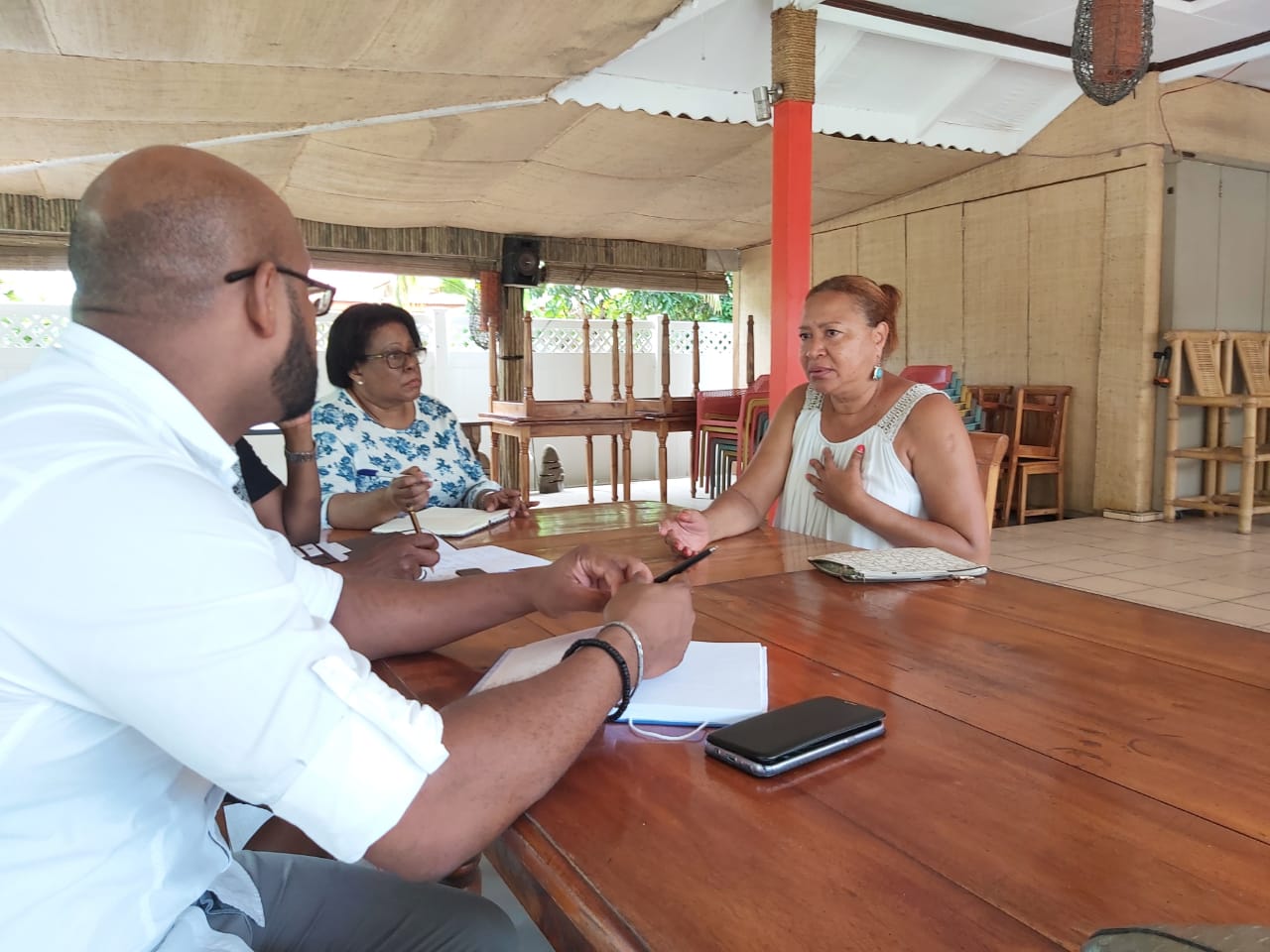
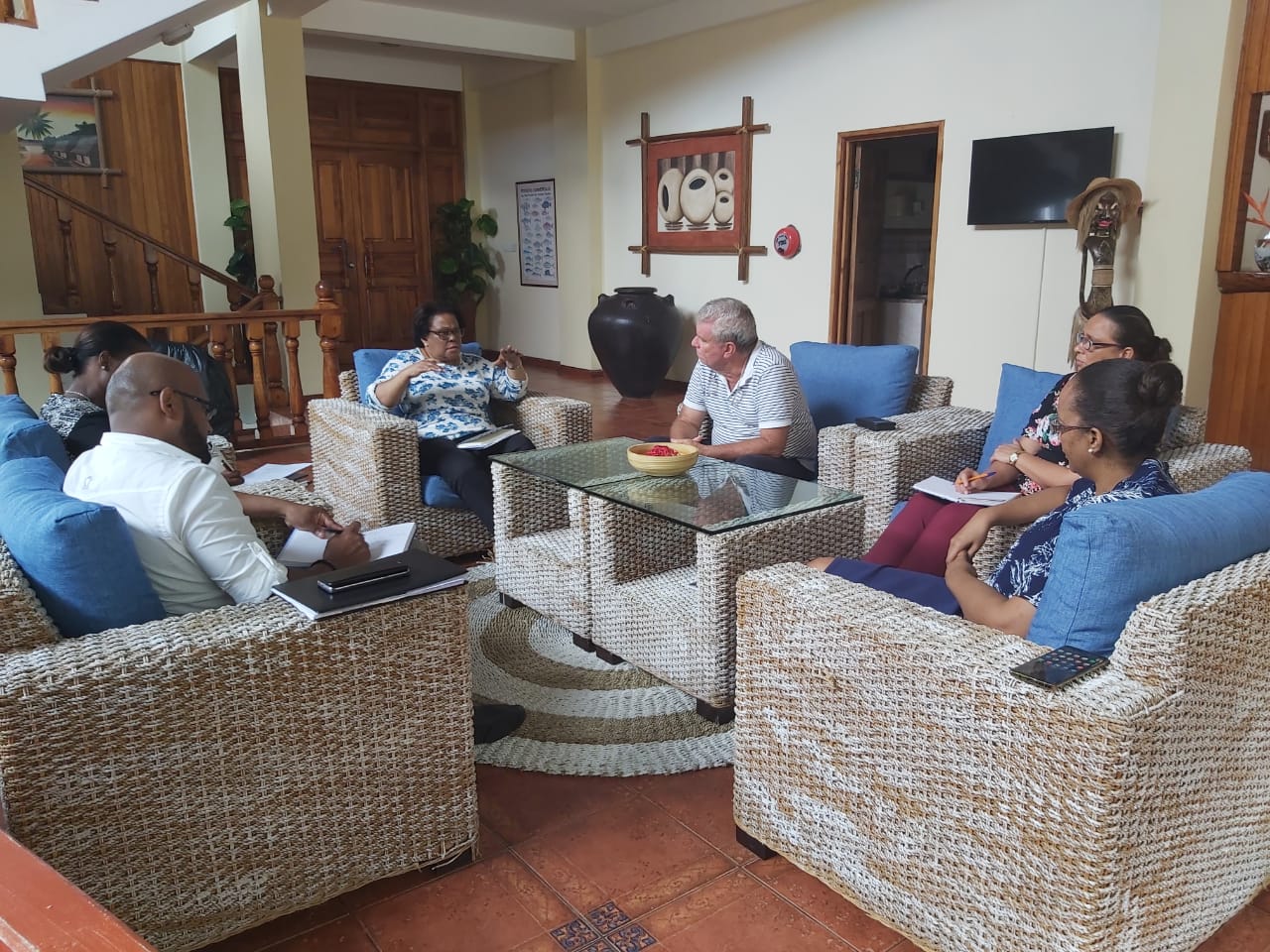
[i] Moonlight Beach Villa, Villa Charme de l’Ile, Veronic Self-Catering Guest House, Villa Authentique, Marie-France Beach Front Apartment, Old Pier Café, Zerof Restaurant and Guest House.
[ii] Vilaz Patatran.
People seeking a job encouraged to take work opportunities available
People who are out of a job either as a result of the economic downturn caused by the COVID-19 pandemic, school leavers or others are being encouraged to seize the limited work opportunities offered to them.
Letimie Dookley, director general of employment programme in the department of employment, said as work opportunities become more limited it is becoming more difficult to get a placement for the increasing number of job seekers.
“Our message to everyone seeking to be assisted with a job is to please note that job opportunities are now very limited compared to last year when there were lots of jobs but few job seekers, but which is no longer the case. There are suddenly many job seekers but few job opportunities. Therefore, it is important that you do not refuse a job opportunity even though it is not one that you were dreaming of doing,” said Mrs Dookley.
She added that “considering the present difficult economic situation, it is not the time to be choosy. If you want a job please seize the opportunity offered to you.”
Mrs Dookley said they are facing a lot of difficulty to change people’s attitude, manage their expectations and do a lot of counseling to convince and guide them towards job opportunities that are available and not what they want.
Meeting with the press yesterday morning at Independence House Annex, Mrs Dookley also gave details of the different employment programmes in place to help people through training, placement in different organisations so that eventually they can secure a permanent job.
Ms Dookley also clarified the difference between the newly created Seychelles Employee Transition Scheme (Sets) whose mandate is to support those made redundant following the economic impacts of COVID-19. The main objective of the scheme is to ease retraining, up-skilling, and temporary work placement services, supporting re-entry into the labour market as job openings become available whilst providing financial support.
Mrs Dookley also explained the working relationship and collaboration of the employment department and the Agency for Social Protection (ASP).
The Skills Development Programme targets young people who have not completed secondary, did not secure a place at any professional centres or did not complete a training course and who are aged between 15 and 30 years.
“Young people under this programme do not have any skills and are placed in different workplaces where they receive on-the-job training based on their interest and work opportunities available for them to receive training. The training is for a period of between six and 18 months but all depends on the nature and technicality of the job,” Mrs Dookley explained.
Following a recent review, the allowances they were receiving have increased as of July 1 as follows:
Participants with children receive R5,000
Participants aged 15 to 20 receive R3,500
Participants aged 21 to 30 receive R4,500
Under this programme government pays 70% of the allowances and the employers 30%, but given the COVID-19 situation the government is covering the entire allowances of the participants until December.
For the period April to June, Ms Dookley stated that 45 young people registered to join the programme but placement has been secured for only 14 of them, while around 30 are still waiting for placements and one has already secured permanent employment.
Furthermore, Mrs Dookley highlighted that for this year up to now, the employment department has noted a remarkable decrease in the number of placements that it can secure for the participants as a result of the COVID-19 pandemic which has resulted in many hotels closing down and leaving many young people under the programme who had expressed the desire to follow training at hotel establishments uncertain. Mrs Dookley said several of them require counseling and a lot of convincing to redirect their interest towards employment opportunities that are available.
My First Job Scheme caters forprofessional centre graduates byfacilitating their entry on the labour market and the government through the ASP provides a 40% refund of the graduates’ salaries capped at R7,000 for a year. The participants are placed in employment and become normal employees.
Under the scheme there are two sub-programmes ad these are:
- Internship for graduates from professional centres who are facing difficulties to secure employment are enrolled on an internship programme for a period of six months (renewable). They receive R5,800 as allowance.
- Internship programme for university graduates who are facing difficulties to secure permanent employment will be enrolled on the programme for a period of six months (renewable) and their allowance is R8,550.
Mrs Dookley is calling on all returning graduates as well as those from the University of Seychelles to register under these programmes.
From the beginning of the year to date, Mrs Dookley said they have registered 28 graduates from whom 13 have already secured job placements, one has secured permanent employment while 15 are still waiting for a placement.
As for those young people from professional centres, Mrs Dookley said 66 have registered and 17 of them have already secured a job placement.
Unemployment Relief Scheme (URS) reintroduced in November 2017: people registered either with the welfare officer at their district administration office or at the URS unit at the employment department are vetted by the ASP and the employment department. Genuine cases receive an allowance of R5,800 while waiting for work placement.
Mrs Dookley explained that the scheme brought some relief to a lot of people who were dependent on welfare assistance. Gradually, through the scheme many of them took a job after much counseling and guidance.
For April and June this year, Mrs Dookley said there were 2,752 job seekers, many of them have lost their jobs under the current situation. Compared to the same period last year, only 321 individuals had registered under the programme.
She noted that from the 2,752 there are 290 who have already been placed in permanent employment while 215 are still waiting for a job opportunity.
Participants with minimum qualifications and experience receive R7,056 while those with qualifications and experience receive R8,550.
All participants under the three programmes receive an SPTC card worth R300 to help ease their movement.
Mrs Dookley has meanwhile explained that there is a direct link between the employment department and the ASP and how the two work closely together to better help people in need of financial assistance as well as a job.
She noted that any person who is assisted in any way under any of these schemes there are certain conditions attached and among them if a person refuses any job or job placement or internship, the ASP is informed and if the person goes back to ASP for financial assistance he or she will not necessarily be assisted.
Mrs Dookley also clarified the difference between the newly introduced Seychelles Employee Transition Scheme (Sets) which aims to take care of people who have been made redundant from their jobs as a result of the economic impact of COVID-19.
She stressed that the employment programmes do not entertain redundancy cases.
“Once an employer has followed the redundancy process, the details of his or her employees are then approved by the employment department before these are submitted to Sets which liaises with the employer concerned. It is important for people not to confuse the different schemes,” Mrs Dookley stated.
Marie-Anne Lepathy
Hotel employees, construction workers take unpaid salary grievances to employment department
Some 15 housekeepers from the Coral Strand Hotel and another group of construction workers yesterday took their unpaid salary, overtime pay grievances respectively to the employment department.
It was around 9.50am that the group of housekeepers was seen at Independence House after they had been received by employment officials.
Jacqueline Gabriel, one of the housekeepers, said they are really frustrated as they have not yet received their salary for June.
“We were supposed to have been paid our salary on July 5 but today is July 7 and nobody is giving us any information regarding why payment has been delayed and we are frustrated. So as a group we went to see our general manager who told us that the hotel’s account has been frozen so we would be assisted by the government, therefore we have come to find out when the government will release the money so our salaries can be paid,” she said.
Another of her colleagues vented her frustration out loud noting that like everybody else they have utility bills, daycare fees to pay, food to buy, children to take care of and on top of that they have to pay for bus fares to go to work and they cannot meet their expenses without their salaries.
Stephanie Boniface, senior employment officer, said they are aware of the situation as they had been informed by the hotel management and the necessary discussions are ongoing with the concerned authorities to address it and the salaries are expected to be paid during the course of this week.
Meanwhile, another group of around 30 workers from a construction company based at Pointe Larue also brought their concerns to Independence House yesterday.
Ms Boniface confirmed that at the end of May they received the complaint that overtime, work done on public holidays were not being paid. A meeting was held with the employer and another one with both employer and workers to try and resolve the matter and factual documents were requested by the employment department to be analysed for breach of the law, but the employer did not meet the deadline to comply which was this week but has instead asked for a five-day extension to finalise the required documents.
She said it is only after receiving the documents that a decision on whether or not there has been any breach of the law will be made.
Marie-Anne Lepathy
COVID-19 SCCI proposes recoveryand prosperity plan
The private sector, through the Seychelles Chamber of Commerce and Industries, yesterday presented its recovery and prosperity plan, a diureticto revive businesses, at the scheduled weekly meeting chaired by President Danny Faure at State House.
The plan is a proposal championing private-public partnership to re-build, re-energise and re-think the economy.
Chairman of the Seychelles Chamber of Commerce and Industries (SCCI) Oliver Bastienne noted that this national private sector agenda being proposed “looks at our recovery and how to emerge out of the crisis of COVID-19.”
The meeting at State House was also attended by key representatives of the government as well as other private sector associations such as the Praslin and La Digue business associations and the Seychelles Hotel and Tourism Association (SHTA).
SCCI developed its recovery and prosperity plan after conducting numerous surveys and interviews with partners and businesses in the private sector.
“We are very happy that the president listened to our plan and committed to supporting the agenda,” Mr Bastienne noted, adding that President Faure has given the go-ahead for SCCI to formulate a concrete action plan aligned with Vision 2023 and the national strategic development plan.
“When we completed this survey we understood that there are seven major pillars that the private sector wants to work in collaboration with the government to resolve. This involves the capacity of enterprises, micro and small businesses; look at how they are assisted and the environment they work in,” Mr Bastienne explained.
SCCI is also hoping to diversify trade with overseas market and to develop plans across different sectors and industries.
Mr Bastienne noted that it is important for other sectors to explore ways to further contribute to create employment and to the national GDP, rather than have the country solely depend on the tourism sector.
“It is important to understand that each industry has its limitations, opportunities and coherent themes but they each must have a sectorial plan even though we recognise tourism as our main economic pillar.”
Emerging sectors such as the green economy should also be encouraged to grow in a more inclusive business landscape, Mr Bastienne added.
This plan would also look at how the country can enhance the capabilities and skills of Seychellois workers so that they can better fit into this transition period and beyond.
Another pillar which SCCI deems important is the development of infrastructures including access to land, water, electricity, the ports and connectivity between the inner islands.
“We also spoke of digital growth and digitisation, and develop a plan on how every actor in the economycan evolve in this direction.”
Lastly, SCCI’s plans state that inclusive dialogue is essential for future growth, noting that consultations between government and private sector should be further strengthened especially in regards to drafting of policies and legislations.
In yesterday’s meeting, the principal secretary for finance,Damien Thésée, also briefed those present on a new rapid interest free loan scheme which will help ensure micro and small businesses can obtain financing required to survive the economic impact of the COVID-19 crisis.
This new loan facility is in addition to the Central Bank of Seychelles loan scheme, tax deferrals, and job retention schemes, which are already assisting businesses in the country.
Mr Bastienne highlighted that this is a positive move, especially since over 90% of businesses in Seychelles comprises SMEs.
The meeting was also an opportunity to review the ongoing implementation of the Financial Assistance for Job Retention programme (FA4JR) where the private sector had the opportunity to raise concerns and make new proposals in regards the appeals process and existing criteria to qualify for assistance. The FA4JR committee will now review the propositions put forward by the representatives.
The next consultative session will be held next Tuesday July 14, 2020.
Apart from Mr Bastienne, present for the meeting at State House were the Minister for Tourism, Civil Aviation, Ports and Marine Didier Dogley, Minister for Finance, Trade, Investment and Economic Planning Maurice Loustau-Lalanne, Minister for Employment, Immigration and Civil Status Myriam Telemaque, Secretary of State for Finance and also chairperson of the FA4JR committee Patrick Payet, Attorney General Frank Ally, Governor of the Central Bank of Seychelles Caroline Abel, principal secretary for finance Damien These, principal secretary for employment Jules Baker, special advisor for employment Veronique Bresson, economic advisor to the President Bertrand Belle, secretary general of SFWU Antoine, executive secretary of GETUS Tina Hoarau, chairperson of SHTA Sybille Cardon, vice-chairperson of SHTA Allen Mason, SCCI councillor Robert Stravens, SCCI councillor Sanjay Naidoo, chief policy analyst for department of employment Susan Morel, director general for employment promotion Letimie Dookley, representative of the La Digue Business Association Jose St Ange and representative of the Praslin Business Association Paul Rouillon.
Elsie Pointe
